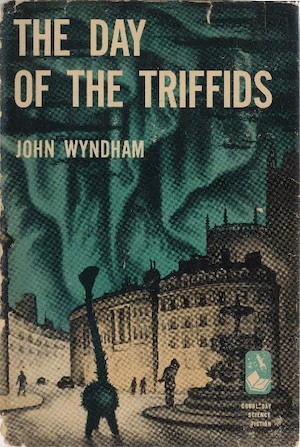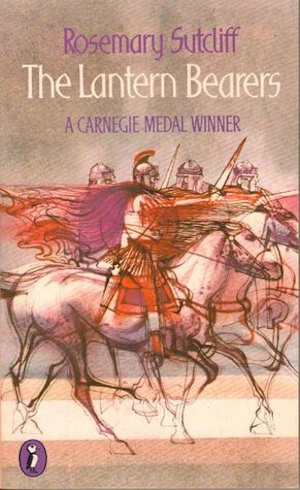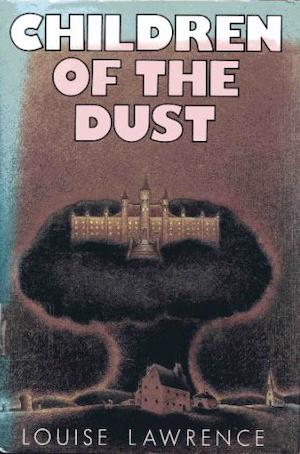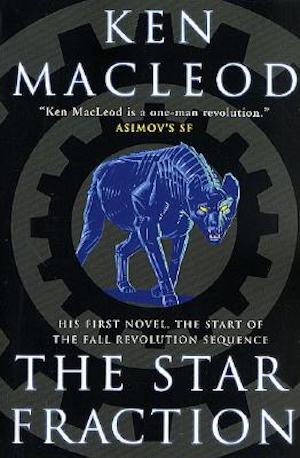To live in Britain is to live in eternal existential anxiety. The tiny island nation lives on the knife-edge of global warming-driven sea level rise (which would submerge much of what is now dry land) and global cooling, which, while not on the books in the immediate future, has in the past repeatedly scoured hominin life from the region. It’s not surprising that many authors have offered visions of an ephemeral United Kingdom that is no longer united…
The Day of the Triffids by John Wyndham (1951)

A horticultural mishap put Bill Masen in hospital with his eyes temporarily bandaged. Consequently, he is denied the wondrous meteor shower that lights up Earth’s sky, as well as the total blindness that strikes every person unlucky enough to have sought out a view of the meteors. Once the reality sinks in—that the vast majority of the human population is now incurably blind—he does the only responsible thing a decent middle-class Englishman could do in his place: he abandons the useless blind to certain death.
In very short order, the United Kingdom is transformed from a single realm to a mass graveyard in which, here and there, small autonomous communities of the lucky prevail…for the moment.
Calamity for humanity was opportunity for the triffids (carnivorous ambulatory plants recently introduced to the UK). The helpless blind were their first victims. Now, with the masses dead and triffid numbers soaring, the only substantial meals remaining are the sighted enclaves. Places like Masen’s own farm.
***
The Lantern Bearers by Rosemary Sutcliff (1959)

Eighteen-year-old Aquila remains behind with his family in Britain when the cavalry in which he serves is called back to the Continent by the demands of 5th-century Roman politics. Roman Britain must fend for itself. Aquila will fend for his family.
As above, so below: Roman Britain collapses under barbarian invasion in surprisingly short order and Aquila’s family estate is at the forefront of this collapse. Overwhelmed by a Saxon attack, his father slain, his sister carried off, a wounded Aquila is tied to a tree and left to die. He survives, but soon realizes that restoration, a return to normalcy, is impossible. All he can do is adapt to a new, post-Roman Britain.
***
Children of the Dust by Louise Lawrence (1985)

Aware that Soviet nuclear attack is imminent, a handful of functionaries retreat to the Bunker, a fortified base that can withstand the immediate effects of war and its aftermath. Aside from providing the hope that administrators will someday emerge from the Bunker to govern the whole of the nation once more, the British government can do little for its people save for giving them a heads-up that most of them are about to perish.
Generations pass. Only the countryside nearest the bunker at the focus of the novel falls under what rudimentary government that Bunker can provide. Other pockets of survivors will have to fend for themselves. Perhaps they have bunkers of their own!
At first, the Bunker and its supplies of modern equipment give it the advantage over its rustic subjects. Supplies are finite, however. One day the last machine will break and the final tin of beans will be eaten. On that day, will the denizens of the Bunker be able to adapt as their mutated cousins have? Or will they join the rest of the pre-war world in extinction?
***
The Star Fraction by Ken MacLeod (1995)

Rescued by US/UN intervention from the perils of the United Republic’s radical democracy, Britain is home to a patchwork of micro-states under the umbrella of the restored Hanoverian monarchy. Within sensible limits, each micro-state is free to govern itself as it sees fit, with heavily armed, remotely piloted war robots providing gentle rebukes should anyone overstep the US/UN guidelines.
Although the peace process can be trying from the perspective of the common person in the street, the system provides something the US/UN treasures: stability. However, stability is a chimera. An unseen enemy has been waiting patiently to bring the US/UN regime down. Now, thanks to a mercenary, a fundamentalist teen, and a scientist, the revolution has come.
***
New Model Army by Adam Roberts (2010)

Pantegral is a new model army, the Uber of mercenary forces. Eschewing expensive gear like artillery, devolving functions like logistics from complex bureaucracies down onto individual soldiers, equipped with modern, high-speed networking, Pantegral is a lean, cost-effective organization with which conventional armies are hard pressed to deal.
Faced with a United Kingdom curiously unwilling to let Scotland go its own way, Scotland turns to Pantegral for salvation. British Forces-deserter-turned-Pantegral foot soldier Tony Brock finds himself facing his former employers. More importantly, the British Army finds itself facing a New Model Army: an unstoppable, decentralized swarm of armed soldiers spreading chaos through England’s vulnerable cities.
***
Obviously, this is a populous subgenre such that for every example I can adduce, you can collectively think of dozens. Comments are below.
In the words of Wikipedia editor TexasAndroid, prolific book reviewer and perennial Darwin Award nominee James Davis Nicoll is of “questionable notability.” His work has appeared in Publishers Weekly and Romantic Times as well as on his own websites, James Nicoll Reviews and the Aurora finalist Young People Read Old SFF (where he is assisted by editor Karen Lofstrom and web person Adrienne L. Travis). He is a four-time finalist for the Best Fan Writer Hugo Award and is surprisingly flammable.










